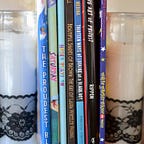Poetry and literature after Hurricane Katrina (a reflection after reading Ninth Ward by Jewell Parker Rhodes)
By Rachel Amaru, Co-Founder of Good Trouble For Kids
While Ninth Ward by Jewell Parker Rhodes elaborates on Hurricane Katrina’s impact on a family in New Orleans, the entire Gulf Coast was terribly damaged. The poet Natasha Tretheway reflects on this in Beyond Katrina: A Meditation on the Mississippi Gulf Coast. You can listen (or read) this NPR interview with Tretheway, and also read an excerpt from her book.
Below is Tretheway’s poem, “Liturgy to the Mississippi Gulf Coast.” The link will also take you to a beautiful piece she wrote about her process of writing this poem, and of visiting home nine months after Katrina.
Liturgy to the Mississippi Gulf Coast
To the security guard staring at the Gulf
thinking of bodies washed away from the coast, plugging her ears against the bells and sirens — sound of alarm — the gaming floor on the Coast;
To Billy Scarpetta, waiting tables on the Coast, staring at the Gulf thinking of water rising, thinking of New Orleans, thinking of cleansing the Coast;
To the woman dreaming of returning to the Coast, thinking of water rising, her daughter’s grave, my mother’s grave — underwater — on the Coast;
To Miss Mary, somewhere;
To the displaced, living in trailers along the coast, beside the highway, in vacant lots and open fields; to everyone who stayed on the Coast, who came back — or cannot — to the Coast;
To those who died on the Coast.
This is a memory of the Coast: to each his own recollections, her reclamations, their restorations, the return of the Coast.
This is a time capsule for the Coast: words of the people — don’t forget us —
the sound of wind, waves, the silence of graves,
the muffled voice of history, bull-dozed and buried under sand poured on the eroding coast,
the concrete slabs of rebuilding the Coast.
This is a love letter to the Gulf Coast, a praise song, a dirge, invocation and benediction, a requiem for the Gulf Coast.
This cannot rebuild the Coast; it is an indictment, a complaint, my logos — argument and discourse — with the Coast.
This is my nostos — my pilgrimage to the Coast, my memory, my reckoning — native daughter: I am the Gulf Coast.
***
Artists will continue to address Hurricane Katrina with words and visual art. It is how they will witness, how they will remember. Art is one way we humans navigate trauma. Please read more about Jerika Marchan’s Poetry of Hurricane Katrina and this recent piece on PBS about how poetry on the hurricane has served, and continues to serve, a therapeutic role — this is a good example of bibliotherapy. The PBS link includes a number of poems, and video of a Zoom event put on by Poets & Writers on the 15th Anniversary.
Hurricane Katrina is a seminal event in American history for what it demonstrated (and continues to demonstrate) about government policy and the plight of the poor, especially those who are people of color. Kevin Young, who edited the Library of America Anthology, African American Poetry: 250 Years of Struggle & Song (from which I frequently quote), perhaps alludes to this by choosing to title the final section of the collection, “After the Hurricane.”
I highly recommend reading Sarah Broom’s memoir, The Yellow House. Winner of the 2019 National Book Award, it is a beautiful meditation on New Orleans, race, and the devastation and loss caused by Hurricane Katrina.
